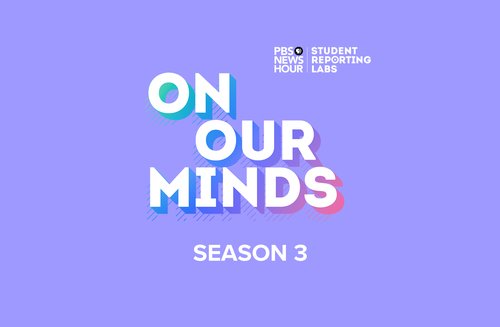
Student Reporting Labs' award-winning podcast, On Our Minds tells the real-life experiences young people face today, their mental health and emotional challenges, and where they are finding help and hope.
The third season of On Our Minds will dive deeper into topics most young people can relate to. Students will report on and produce stories and interviews about the teen experience: challenges, joys, hardships, and triumphs – and how these topics relate to mental wellness. The goal of the podcast is to share POWERFUL STORIES AND INTERVIEWS that document teen life at this point in history and provide tips and resources for how we can better support each other.
OPPORTUNITIES FOR STUDENTS:
This year, we are rolling out Season 3 over the course of the school year: 10 episodes will be released twice per month from December 2022 to May 2023.
Here is an EPISODE LIST WITH POTENTIAL STORY IDEAS:
Students can still work on this project during spring semester; check out the deadlines below *ONLY FOR EPISODES 6-10*.
Themes: Time Management; Romantic Relationships/Friendships; Foster Care/Adoption, and Nature
Journalism
Representation
Stereotypes and Misconceptions
Podcasting
Identity
Health
Mental Health
Active Prompts
Post It Notes
White board, chalkboard or other visual board
Padlet, Jamboard or other app for group collaboration
Mobile Phone
Internet
Notebook
4-6 Weeks
Listen to a few episodes of On Our Minds. For example: From FOMO to Euphoria: How social life affects teen mental health and LGBTQ+ teens on coming out to their immigrant parents.
As individuals or in small groups, talk about what you heard:
Try to tell the STORY (not just opinions) of the young person/people featured. The best stories are ones that bring to life: characters and their emotions, scenes and actions, challenges and conflicts. (Listen to an episode of On Our Minds for inspiration!)
In general, stories show some kind of CHALLENGE and CHANGE: something happens and a character is changed. And what makes the story interesting? Specific details!!
Some guiding questions to ask another person (or yourself):
Transcribe your interview or audio diary. You can use sites like Otter.ai to help generate a transcript then. Then HIGHLIGHT the best soundbites.
Start a document (preferably a shared Google doc) and arrange the best soundbites into the order you want for your story.
Wait to hear from back from SRL with feedback, ask clarifying questions, REVISE AND EDIT a fine cut and then a final cut.
Your story helps shed light on the important topic of youth mental health. It might educate listeners, help people feel less alone, or encourage a young person to reach out for help.